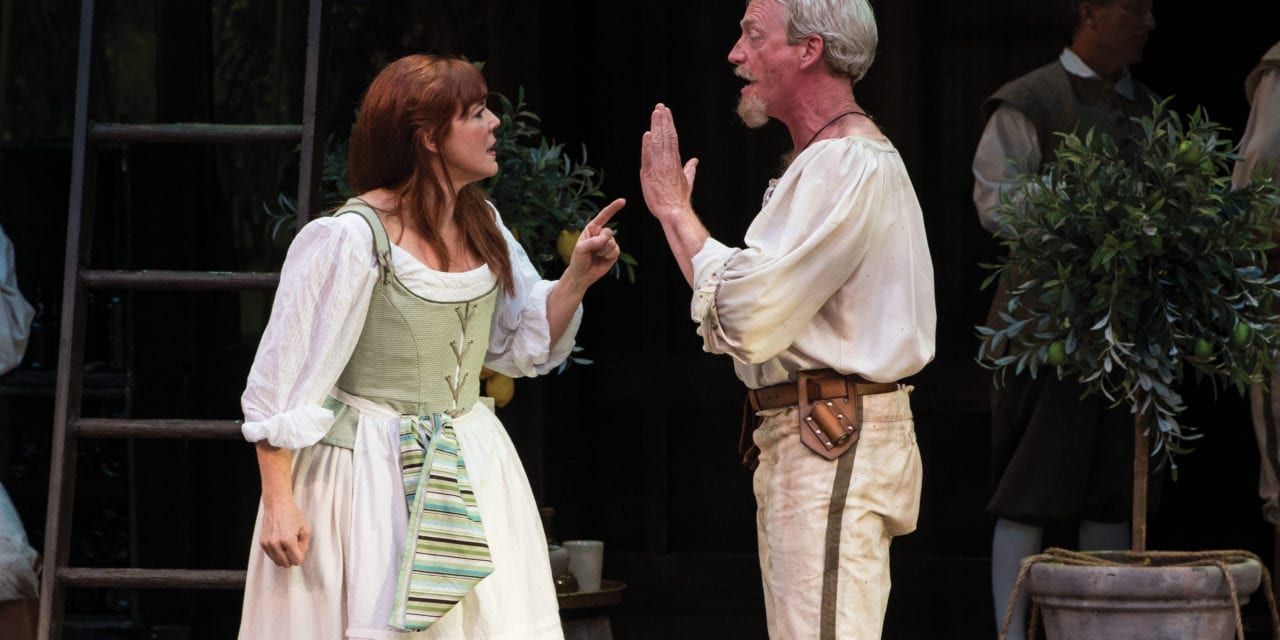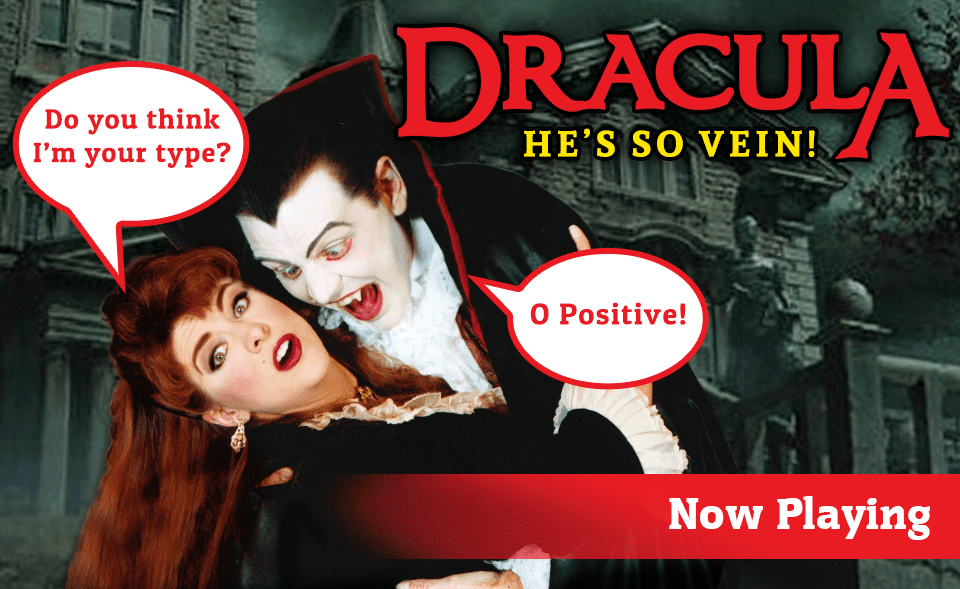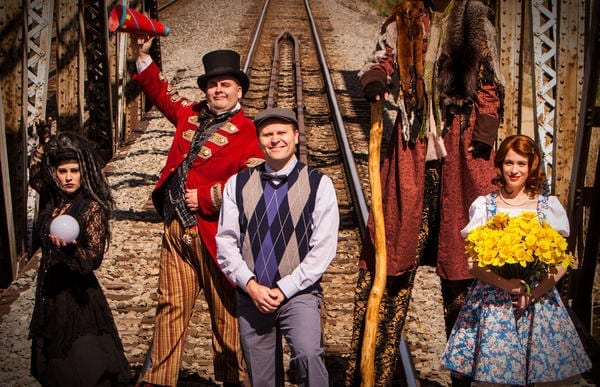CEDAR CITY — Some of my very best friends have been people whom I initially didn’t like at all. For whatever reason, I doubted I would ever esteem that particular person. But time would pass, pride would soften, and luckily, I’d have to eat my words and accept that new friend. Based on those experiences, I completely understand when Beatrice (played by Kim Martin-Cotten) and Benedick (played by Ben Livingston), in Shakespeare’s Much Ado About Nothing, trade in their fighting for affection. Benedick makes a good point when he asks, “Do not appetites change?” It was both sweet and amusing to watch this process of reformation at the Utah Shakespeare Festival this summer.

Show closes September 8, 2016.
Benedick’s friend, Don Pedro (played by Larry Bull) lays out a scheme to Claudio and Leonato, both also close with Benedick, in a humorous way and boasts that when they succeed in making Beatrice and Benedick fall in love, it will be clear that, “We are the only love gods!” The three of them stage a conversation where they know Benedick will overhear them. Each actor in this scene was smart and playful: they over-acted lines that the character had planned ahead, suppressed giggles, and made it feel as if they were making things up in the moment. Livingston ends up in some unusual places as he tries to avoid being seen. I loved when the three men pour dirt and water onto Benedick’s hiding spot, and then run off stage together, laughing. These scenes fit nicely onto Scott Davis’s set of wood and greenery. When the golden hour light from the sun falls on the set through the leaves of his tree, it’s a beautiful effect.

Kim Martin-Cotten as Beatrice and Ben Livingston as Benedick. (Photo by Karl Hugh. Copyright Utah Shakespeare Festival 2016.)
A truly funny actor, Livingston impressed me with his timing and the ease with which he used silent moments or pauses. It is fascinating to watch an actor who allows the audience time to respond, and remains comfortable in that waiting. Livingston did this when going over the personal evaluation he’d overheard from his friends. The “Prince’s jester?” he wonders and then waits a beat. I was very impressed with him in this show.
Unfortunately, Martin-Cotten doesn’t measure up to Livingston’s comedic skill. Her jokes were crammed together and similar in delivery. It felt like she was shouting to be heard. Near the beginning of the play, Beatrice jokes about Benedick with one Shakespearean insult after another, while the rest of the cast laughs; but I couldn’t join the ensemble’s enjoyment because I struggled to understand her. And her version of the tree climbing/hiding scene disappointed me as well. Partially to blame, though, were the absurd sound effects (by sound designer Joe Payne) used in the Engelstad theater. I was surprised that director David Ivers included, because they made the play feel cartoonish at times.

Left to right: Luigi Sottile as Claudio, John Oswald as Friar Francis, and Leslie Lank as Hero. (Photo by Karl Hugh. Copyright Utah Shakespeare Festival 2016.)
The second love story in Much Ado belongs to the young Claudio, whose previous fondness for Hero (played by Leslie Lank), the daughter of Leonato, has blossomed into love. While playing Claudio, Luigi Sottile ensures that his character feels every emotion quite intensely in this play: he is madly in love, instantly suspicious, bitter and furious, broken with grief, and then beaming with joy. Sottile and Livingston had a great rhythm together when they discussed the girls.
The prince’s brother, Don John (played by J. Todd Adams) is apparently just a mean guy seeking entertainment, so he sets about to mess up Claudio’s relationship and consequently Hero’s life. Don John tricks Claudio into thinking Hero has been unfaithful, and Claudio denounces her in front of everyone they know. Leslie Lank, as the gentle Hero, dressed in the most beautiful wedding gown (designed by Bill Black), reacts to the accusations with pure devastation. She looked shocked, wounded, and weak. Don Juan exits the play, satisfied with his prank, and leaves his accomplices to deal with the fallout. There were many powerful reactions to Hero’s disgrace; even her father, Leonato (played by Peter Lohnes), turns on her. Lohnes portrays a normally congenial man, but in this scene, he unleashes hell’s fury on Hero. Another memorable reaction in this subplot came from Kim Martin-Cotten, who showed a lot of strength as she cleaned up the wedding flowers and then asked Benedick, in a low and resolute voice, to kill Claudio.

Left to right: Brandon Burk as Borachio, J. Todd Adams as Don Juan, and Alexis Baigue as Conrade. (Photo by Karl Hugh. Copyright Utah Shakespeare Festival 2016.)
Sometime later Borachio, one of Don John’s cohorts, is overheard talking about the deception. And over a few scenes, Borachio (played by Brandon Burk) and Conrade (Alexis Baigue) are arrested and brought before Leonato by three night watchmen and their superior. Jack Lafferty, Marco Antonio Vega, and Michael C. Thatcher play these watchmen as the most lovably simple servants, dressed by Black in charming country apparel, and I enjoyed every moment they were onstage. Whispering their thanks to God, they obediently followed Constable Dogberry (played by John Plumpis), as he led them in his proud uneducated way to great comedic effect. Dogberry’s lack of counting skills and fixation on being called “an ass” by the criminals are two very memorable traits. The fifth member of this humble crew was a fun surprise that I’ll let others discover on their own. I should mention that I found it very difficult to “overhear” Burk’s bragging myself, but his later confession was clear and emotive.
Claudio and the Prince feel deep regret at having believed the lie, and they mourn Hero in a haunting and beautiful scene. Both characters are formally dressed and Claudio kneels before a large group of red glowing candles. The stage is dim and a bittersweet melody comes from the upper level of the stage, sung by Latoya Cameron and Keaton Johns. Hero, in a hooded cloak watches over the scene, and Claudio weeps. The lighting design was by Donna Ruzika, who also created some nice stormy weather at the end of the first act.
This Much Ado About Nothing is the funniest of the festival’s shows right now. David Ivers production feels true to Shakespeare and the elements I expect to encounter. I enjoyed this talented cast and the technical elements that enhanced the production. All the trickery amounted to two very happy couples, including Benedick and Beatrice who, though they began as rivals, needed only the knowledge that they were loved for them both to love in return.






